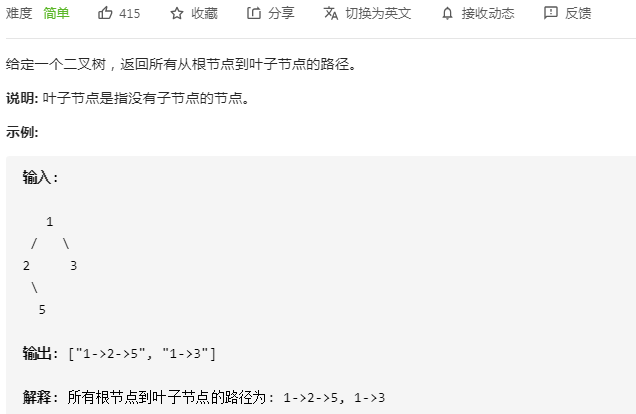
一看就会一写就废(╯﹏╰)
☆☆☆方法1:DFS前序遍历。路径是从根开始的, 于是想到前序遍历
☆☆☆方法2:BFS层序遍历。
☆☆☆☆方法3:递归。
代码1:
class Solution { public List<String> binaryTreePaths(TreeNode root) { List<String> res = new ArrayList<>(); dfs(root, "", res); return res; } private void dfs(TreeNode root, String path, List<String> res) { if (root == null) return; //如果是叶子节点,说明找到了一条路径,把它加入到res中 if (root.left == null && root.right == null) { res.add(path + root.val); return; } dfs(root.left, path + root.val + "->",res); dfs(root.right,path + root.val + "->" ,res); } }
代码2:
class Solution { public List<String> binaryTreePaths(TreeNode root) { /** * 方法2:BFS层序遍历 * 维护两个队列,分别存储节点以及根到该节点的路径 * 如果是叶子节点,则将对应的路径添加到结果中 */ List<String> paths = new ArrayList<>(); if (root == null) return paths; Queue<TreeNode> nodeQueue = new LinkedList<>(); Queue<String> pathQueue = new LinkedList<>(); nodeQueue.offer(root); pathQueue.offer(String.valueOf(root.val)); while (!nodeQueue.isEmpty()) { TreeNode cur = nodeQueue.poll(); String path = pathQueue.poll(); // 叶子节点 if (cur.left == null && cur.right == null) { paths.add(path); }else { if (cur.left != null) { nodeQueue.offer(cur.left); pathQueue.offer(new StringBuilder(path).append("->").append(cur.left.val).toString()); } if (cur.right != null) { nodeQueue.offer(cur.right); pathQueue.offer(new StringBuilder(path).append("->").append(cur.right.val).toString()); } } } return paths; } }
代码3:
class Solution { public List<String> binaryTreePaths(TreeNode root) { List<String> res = new ArrayList<>(); if (root == null) { return res; } if (root.left == null && root.right == null) { res.add(String.valueOf(root.val)); return res; } List<String> leftS = binaryTreePaths(root.left); for (String path : leftS) { res.add(root.val + "->" + path); // 组成更长的路径 } List<String> rightS = binaryTreePaths(root.right); for (String path : rightS) { res.add(root.val + "->" + path); } return res; } }